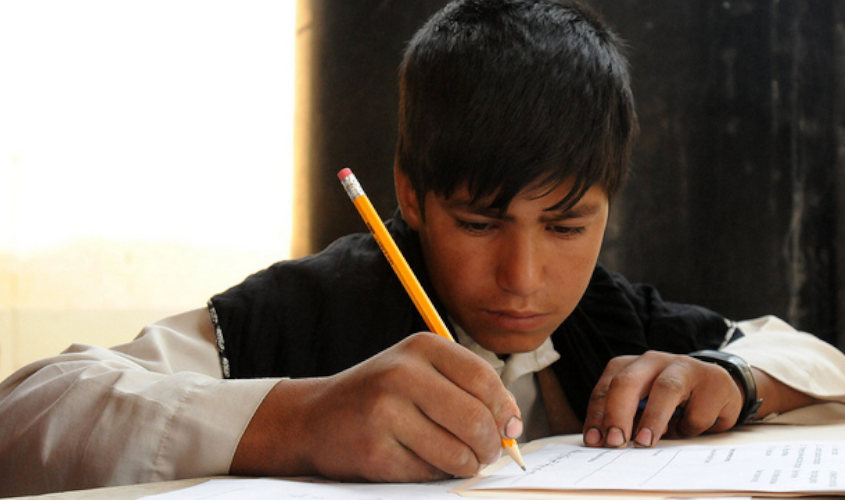He Who Opens a school door, closes a prison

An child participating in a literacy program in Afghanistan. Photo © ResoluteSupportMedia
We believe education will be one of the most influential drivers of economic growth and prosperity in our generation and for generations to come. In a world of growing socio-economic division and increasing distrust in government, we, as business leaders, have an opportunity – and a responsibility – to help create a better future for those around us.
For the sixth year in a row, aid allocations to education have fallen, and according to UNESCO, total aid earmarked for education in 2016 stands at US$12 billion – 4 percent lower than in 2010. The UN also reports that there is an annual US$39 billion external education funding gap between what is needed for basic and lower secondary education across Asia, Africa and Latin America and what governments and international aid donors can be expected to fund.
Compounding the challenge is a projection that by 2030, emerging market economies should account for 65 percent of global GDP, being home to the majority of the world’s working age population. But if current trends continue, around 1.5 billion of these people will have no education beyond primary school, preventing countries from leveraging their burgeoning labour force to achieve higher productivity and growth. It’s clear that the economic and social benefits from investing in education are substantial and widespread – for example, it is estimated that one extra year of schooling increases an individual’s earnings by up to 10%.
A role for the private sector
Too often, the public sector and education systems, in particular, are stretched beyond their capacity. By focusing our efforts on driving education and learning at all stages of life, we believe the private sector can play a crucial role in bridging the gap and helping break the cycle of poverty.
We know that through the work KPMG professionals do each day, we help bring together a wide range of informed perspectives and expertise, connecting companies, governments, regulators and the public at large. KPMG member firms have a unique opportunity to build powerful relationships, using our global network to develop collaborative solutions that can help transform lives – it’s why we joined the Global Business Coalition for Education (GBC-Education).
As it stands, corporate contributions to global health amount to 16 times more than those to education. This level of corporate support for education would appear inadequate, particularly since the business community has a vested interest in strengthening educational systems to ensure a skilled workforce for the future. The statistics speak for themselves. According to UNESCO, 103 million youth worldwide lack basic literacy skills while 600-800 million young people will be without productive employment by 2030. This shouldn’t come as a surprise to most business leaders, as 40 percent of employers globally claim they find it difficult to recruit people with the right skill set. But by investing in young people and improving access to education, we can build organisational capability, raise productivity and strengthen economies.
A foundation in literacy
Literacy is a critical determinant in how likely a child is to succeed in school and a foundation for their future prosperity. But overcoming shortfalls in education systems and reducing global illiteracy rates remains a significant challenge. Across the globe, around 130 million children are still without basic reading skills, despite having completed four years of school.
The impact of developing a child’s literacy skill is profound. If all students in low-income countries gained basic reading skills in school, 171 million people could be lifted out of poverty – the equivalent of reducing global poverty by 12 percent. Increasing literacy at this scale would also impact our economies, helping to alleviate the estimated US$1.2 trillion loss per year to the global GDP stemming from functional illiteracy.
Our commitment to improving society and the communities in which we live and work has always been core to our values at KPMG. As a large private sector employer with global reach across markets, we knew that KPMG people could play a vital role in combating childhood illiteracy. That’s why we launched KPMG’s Family for Literacy (KFFL) in the United States in 2008. Recognising the importance of reading skills to a child’s future success and knowing the biggest obstacle to children’s literacy in low-income communities is access to books, KFFL provides culturally-relevant books to children from low-income families. Since 2008, KPMG professionals and their families have provided more than 3 million books to children around the world, with the programme expanding to a large number of countries, including India, Ireland, Kenya, Mexico, South Africa and the UK.
But our commitment to literacy doesn’t end with KFFL. It is part of KPMG’s wider focus on Sustainable Development Goal 4, to ensure inclusive and equitable quality education and lifelong learning opportunities for all. Given the sheer scale of the global education crisis, we believe we can maximise our impact by combining resources and working with other organisations, like GBC-Education, that share our vision.
Together, we will use our skills, passions and capabilities to drive access, quality and innovation around lifelong learning to ensure no one is left behind.
Authors
| John Veihmeyer Chairman, KPMG International |
Dr Michael Hastings Lord Hastings of Scarisbrick CBE Global Head of Citizenship, KPMG International |
 |
 |
About KPMG
KPMG is a global network of professional services firms providing Audit, Tax and Advisory services. We operate in 152 countries and have 189,000 people working in member firms around the world. The independent member firms of the KPMG network are affiliated with KPMG International Cooperative (“KPMG International”), a Swiss entity. Each KPMG firm is a legally distinct and separate entity and describes itself as such.
